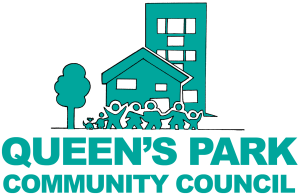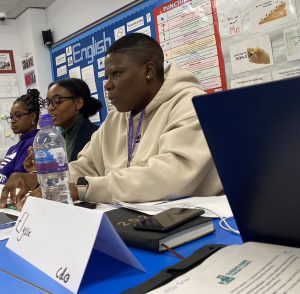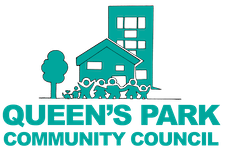
Queen’s Park Community Council (QPCC) is London’s first and only Community (or Parish/Town) Council. It is a statutory body and the first layer of government, distinct and independent from other tiers of government (such as the Borough/City Council and the Greater London Authority).
The Community Council represents more than 14,000+ people living in Queen’s Park Westminster – extending between Kilburn Lane in the north and west, Harrow Road in the south and Portnall Road in the east, including the Queen’s Park Court, Avenues’ Gardens and Mozart estates.
While Parish and Town Councils have existed in rural areas for many years, it was not until 2007 that this form of local government became possible in London.
In 2011, Queen’s Park residents started a campaign to establish a Community Council. Following years of campaigning, the Queen’s Park Community Council was established in 2014. Read more about QPCC’s History.
Our Vision
QPCC aims to promote a strong sense of community and increase the quality of life for all residents of (and visitors to) Queen’s Park. Our vision is of a neighbourhood that has a strong sense of community; a place where people of all ages, cultures, religious and social backgrounds live, work and socialise together.
Our Mission
- To be a voice for Queen’s Park, standing up for all members of our community.
- To respect and safeguard the social mix of the local area, promote community spirit and cohesion, and help to maintain and improve the quality of homes for all.
- To safeguard local services and facilities, in particular those for vulnerable members of our community.
- To create and develop strong and productive partnerships with a range of statutory agencies and local community groups and organisations.
- To make the local area a safer environment and help to reduce crime and accidents.
- To support the regeneration of the local economy and to improve economic and employment opportunities.
- To cherish and enhance our environment, protect our heritage, and use resources wisely to minimise environmental impact.
Our Objectives
- Health and wellbeing – to work with state and voluntary service providers to help identify gaps in services to local people and help fill these gaps where possible with a focus on children and young people, older people and unemployed people.
- A Voice for Queen’s Park – to develop QPCC’s role as a ‘voice’ for the people of Queen’s Park and develop its relationship with partners and key stakeholders.
- Local economy, business and jobs – to consult residents and businesses on improving the area’s commercial viability, and to explore the development of local employment initiatives.
- Improving our environment – to deliver a Neighbourhood Plan, maximise the use of open spaces and the public realm including Queen’s Park Gardens, with a view to optimising the benefits to the community and make our streets safer.
- Community cohesion – to promote community cohesion, neighbourliness and community spirit in all that we do, communicating with residents and supporting local events such as the annual Summer Festival and Fireworks Display.
How Council Works
Queen’s Park Community Council represents the interests of residents and facilitates a range of projects, services and events for the benefit of residents. The Council consists of 12 Councillors, Queen’s Park residents who are democratically elected every four years to carry out an unpaid roles as community representatives.
Councillors work alongside Officers who advise the Council on legal issues and regulations, manage Council finances, projects, information and carry out the Council’s decisions.
The Council also works closely with:
- Volunteers
- Other statutory bodies and agencies
- Local organisations and groups
Funding
Queen’s Park Community Council is funded primarily by a ‘precept’ – a small addition to the Council Tax, collected by the principal authority – Westminster City Council. The precept is entirely immune to public spending cuts and funding fluctuations, ensuring funding sustainability for the Council’s core activities.
On average (2018/2019), the precept of a Band D Household amounts to £46.38 annually or 89p a week.
All Community and Parish Councils have the mandate to increase its precepts. However, Queen’s Park Community has not done so since its establishment in 2014. In addition, the Community Council does not collect precepts from households in receipt of full Council Tax Benefits .
The Council supplements its core income by fundraising from various funding bodies.
 Decision Making
Decision Making
Individual Councillors do not have decision-making powers. Councillors make decisions democratically at Council Meetings. These meetings are open to the public, and the agenda and papers are available to residents at least three days before. Find more information about Council Meetings, Agenda and Papers.
The Council delegates some decision-making to four Committees: People Committee, Place Committee, HR Committee and Appeals Committee. Each Committee is compromised of at least four Councillors with delegated decision-making aligned with a specific remit. All Committee decisions are reported to Council Meetings.
Officers also have delegated decision-making powers which enabled them to implement Council and Committee decisions and ensure the day-to-day running of the Council. These delegated powers are governed by the Standing Orders (the Council’s primary governance document) and are reported to Council and Committee Meetings.
There are also several Working Groups comprising residents and Councillors, each with its own remit. Working Groups do not have decision-making powers; their primary function is gathering information, discussing new ideas, organising activities and making recommendations to Committees and the Council. Sometimes, the Council and Committees request a Working Group to consider particular issues or carry out specific tasks. All working group activities are reported at Council and Committee Meetings.
